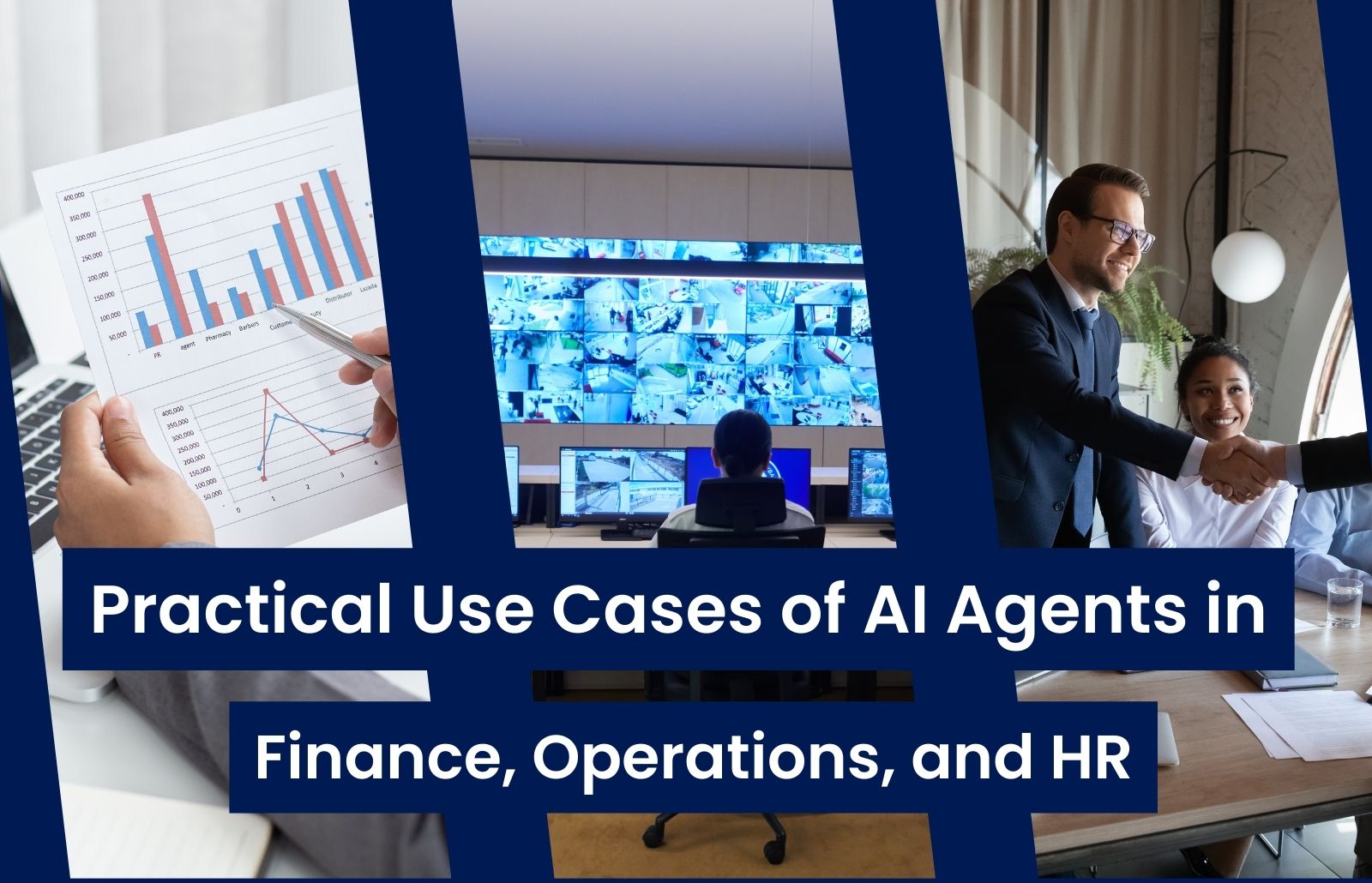Artificial Intelligence (AI) has rapidly transformed industries by automating tasks, improving decision-making, and enhancing operational efficiency. Among the various AI advancements, AI agents have emerged as powerful tools in multiple business domains. This article explores practical AI agent use cases in finance, operations, and human resources (HR), demonstrating how businesses can leverage AI to drive efficiency and innovation.
AI Agent Use Cases in Finance
The financial sector has been a prime adopter of AI technologies, leveraging AI agents to optimize workflows, mitigate risks, and improve customer experiences. Here are some of the key applications:
1. Fraud Detection and Prevention
Financial institutions are at constant risk of fraud, making it crucial to detect anomalies quickly. AI agents analyze massive datasets in real time, identifying suspicious transactions and patterns indicative of fraud. By using machine learning algorithms, AI agents can adapt to emerging fraud tactics, reducing financial losses.
2. Risk Management and Credit Scoring
AI agents assess creditworthiness by analyzing customer data, transaction history, and behavioral patterns. Unlike traditional credit scoring models, AI-powered risk assessment considers non-traditional data sources, such as social media activity or online behavior, to provide more accurate lending decisions. This improves financial inclusion and reduces loan default rates.
3. Algorithmic Trading
Investment firms employ AI agents to execute trades at optimal times based on historical data, market trends, and sentiment analysis. These AI-driven trading systems operate at speeds and accuracies beyond human capability, maximizing returns while minimizing risks. Automated trading bots have become indispensable for hedge funds and financial institutions.
4. Personalized Financial Advice
AI agents are transforming wealth management by providing personalized financial advice tailored to individual investment goals. Robo-advisors analyze user profiles, market conditions, and risk tolerance to recommend optimal investment strategies. This democratizes financial planning, making expert-level advice accessible to a wider audience.
5. Regulatory Compliance and Reporting
Financial institutions must comply with stringent regulations and reporting requirements. AI agents automate compliance monitoring by analyzing transactions and detecting non-compliance risks. They also streamline reporting processes by generating accurate regulatory reports, reducing manual effort and compliance costs.
AI Agent Use Cases in Operations
AI agents are revolutionizing business operations by automating workflows, optimizing resource allocation, and improving decision-making processes. Here are key AI agent use cases in operations:
1. Supply Chain Optimization
AI agents enhance supply chain efficiency by predicting demand fluctuations, optimizing inventory levels, and identifying potential disruptions. By analyzing historical and real-time data, AI-driven supply chain systems ensure businesses maintain optimal stock levels while minimizing waste and storage costs.
2. Predictive Maintenance
Manufacturing and logistics companies use AI agents to predict equipment failures before they occur. By analyzing sensor data, historical performance metrics, and environmental conditions, AI-driven predictive maintenance minimizes downtime, reduces repair costs, and enhances operational efficiency.
3. Process Automation and Workflow Management
AI agents automate repetitive operational tasks such as data entry, invoice processing, and order management. Robotic Process Automation (RPA) combined with AI enables businesses to streamline workflows, improve accuracy, and free employees to focus on higher-value tasks.
4. Customer Support Automation
Businesses leverage AI chatbots and virtual assistants to handle customer inquiries, complaints, and requests. AI-powered customer support agents understand natural language, provide instant responses, and escalate complex issues to human representatives, ensuring a seamless customer experience.
5. Logistics and Route Optimization
AI-driven route optimization improves delivery efficiency by analyzing traffic patterns, weather conditions, and real-time fleet data. Companies like FedEx and UPS use AI agents to plan optimal delivery routes, reducing fuel consumption and ensuring timely deliveries.
AI Agent Use Cases in HR
Human resources departments are increasingly adopting AI agents to streamline recruitment, employee engagement, and workforce management. Here are key AI agent use cases in HR:
1. Automated Recruitment and Candidate Screening
AI agents speed up the hiring process by analyzing resumes, assessing candidate qualifications, and ranking applicants based on job requirements. By leveraging natural language processing (NLP), AI-driven applicant tracking systems (ATS) identify the best candidates, reducing bias and hiring time.
2. Employee Onboarding and Training
AI-powered virtual assistants guide new hires through the onboarding process, providing relevant resources, answering queries, and automating administrative tasks. AI-driven training platforms personalize learning experiences based on employee skill levels and career goals.
3. Employee Engagement and Sentiment Analysis
AI agents analyze employee feedback, emails, and surveys to gauge workforce sentiment. By identifying dissatisfaction trends, HR teams can proactively address concerns, improve company culture, and enhance employee retention.
4. Performance Management and Career Development
AI-powered HR analytics platforms track employee performance, suggest skill development opportunities, and recommend career advancement paths. AI agents help HR managers make data-driven decisions regarding promotions, training programs, and succession planning.
5. Workforce Planning and Resource Allocation
AI-driven workforce analytics optimize staffing levels, ensuring the right number of employees are assigned to projects based on workload predictions. AI agents forecast workforce demands, helping HR teams balance workloads effectively.
The Future of AI Agents in Business
As AI technologies continue to evolve, AI agents will play an even more significant role in business operations. Companies that integrate AI-driven automation will benefit from improved efficiency, cost savings, and enhanced decision-making capabilities.
However, businesses must also address ethical considerations, such as data privacy, algorithmic bias, and the impact of automation on employment. Ensuring transparency, accountability, and human oversight in AI-driven processes will be crucial for successful AI adoption.
Conclusion
The adoption of AI agents in finance, operations, and HR is reshaping industries by automating tasks, improving efficiency, and enabling data-driven decision-making. Whether it’s detecting fraud in financial transactions, optimizing supply chain logistics, or streamlining HR processes, AI agent use cases continue to expand across business domains.
Organizations that embrace AI-driven automation will gain a competitive edge, enhance productivity, and unlock new opportunities for growth. As AI technologies advance, businesses must stay informed and invest in AI solutions that align with their strategic goals. The future of AI in business is promising, and the time to leverage AI agents is now.


